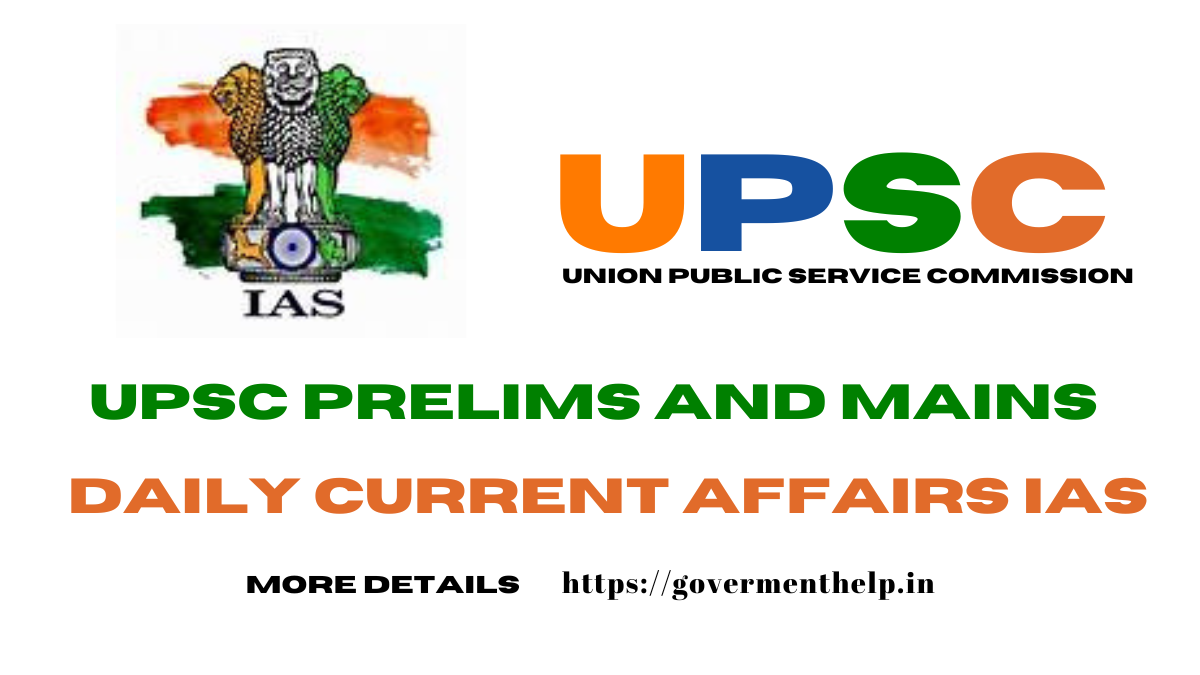 DAILY CURRENT AFFAIRS IAS | UPSC Prelims and Mains Exam (15th October 2024)
DAILY CURRENT AFFAIRS IAS | UPSC Prelims and Mains Exam (15th October 2024)
Introduction: For UPSC aspirants, staying updated with current affairs is essential, especially when preparing for both Prelims and Mains examinations. The questions framed for both stages often revolve around current events of national and international importance, making it crucial for aspirants to remain well-informed. This article covers the most important current affairs for 15th October 2024, with an emphasis on topics relevant to the IAS exam.
Key Topics of the Day
- Global Hunger Index 2024: India’s PositionOn 15th October 2024, the Global Hunger Index (GHI) was released, revealing India’s performance in tackling hunger. The GHI report, prepared annually by Concern Worldwide and Welthungerhilfe, is based on four main indicators: undernourishment, child wasting, child stunting, and child mortality. According to the latest report, India ranked 94th out of 125 countries, which is a slight improvement compared to last year’s position. Despite this progress, India still faces significant challenges in eradicating hunger, particularly in rural and tribal areas.
The National Food Security Act (NFSA) and other government initiatives, such as Pradhan Mantri Garib Kalyan Anna Yojana (PMGKAY), have played a role in improving food distribution systems. However, the report highlights that further reforms are necessary in the areas of agricultural productivity, access to nutritional food, and healthcare infrastructure.
UPSC Relevance: Aspirants need to be aware of India’s position in global indices such as the GHI, as well as related government policies and programs. This topic can be linked to issues related to poverty, hunger, and malnutrition, which are vital for both the Prelims and Mains GS Paper 2 (Social Justice).
- India-Middle East-Europe Economic Corridor (IMEC)A significant development in international relations is the India-Middle East-Europe Economic Corridor (IMEC), a major infrastructure and trade initiative announced in collaboration with the European Union, the US, and key countries in the Middle East. On 15th October 2024, discussions around the corridor continued to make headlines, with officials stressing its potential to revolutionize global trade.
IMEC aims to provide seamless transport and digital connectivity between India, the Middle East, and Europe. This project is seen as a counterweight to China’s Belt and Road Initiative (BRI), and is expected to promote not only economic cooperation but also energy security and cultural exchanges.
UPSC Relevance: This topic is crucial for international relations (IR) and economic development. Aspirants should understand the geopolitical implications of the IMEC, especially concerning India’s role in the global economy and its balancing act with China. This topic links to GS Paper 2 (IR) and GS Paper 3 (Economic Development).
- International Day of Rural Women 2024On 15th October, the world observed the International Day of Rural Women with the theme, “Rural Women: Key to Economic and Agricultural Development.” The day highlights the significant role rural women play in the global food system, from agricultural production to community management.
In India, rural women constitute a large portion of the agricultural workforce, and their contribution to food security, economic development, and environmental sustainability is immense. The Ministry of Women and Child Development has launched several schemes aimed at empowering rural women, including the Mahila Kisan Sashaktikaran Pariyojana (MKSP) and the Self Help Group (SHG) movement.
Despite their contributions, rural women in India still face considerable challenges, such as lack of access to land ownership, credit facilities, and agricultural extension services. Gender inequality remains a persistent issue in rural India, which hinders the overall progress of rural communities.
UPSC Relevance: This topic is important for GS Paper 1 (Society) and GS Paper 3 (Agriculture). Gender issues, empowerment, and rural development are also frequently covered in the essay paper.
- Indo-US Naval Exercise ‘Malabar 2024’On 15th October 2024, the Indo-US Naval Exercise ‘Malabar’ came to an end, marking another chapter in the growing military cooperation between India and the United States. The exercise, held in the Bay of Bengal, also involved Australia and Japan, reinforcing the Quad grouping‘s commitment to ensuring a free and open Indo-Pacific.
The focus of Malabar 2024 was on maritime security, anti-submarine warfare, and counter-terrorism operations. Given the increasing tensions in the Indo-Pacific region, particularly due to China’s assertive policies, this naval drill is seen as a strategic response to maintain stability and peace in the region.
UPSC Relevance: Military exercises and India’s growing role in multilateral defense cooperation are highly relevant for GS Paper 2 (IR) and GS Paper 3 (Internal Security). Questions on defense relations and maritime security often appear in both Prelims and Mains.
- India’s First Green Hydrogen Plant in GujaratOn 15th October 2024, India’s first commercial-scale green hydrogen plant was inaugurated in Gujarat. This plant is part of the government’s ambitious target to reduce carbon emissions and achieve net-zero by 2070. Green hydrogen, produced using renewable energy sources like solar and wind, is considered a key component in the transition to clean energy.
The plant is expected to supply clean hydrogen to industries like steel and cement, which are among the biggest carbon emitters. With global concerns over climate change mounting, the establishment of this green hydrogen plant puts India on the map as a leader in green energy technologies.
UPSC Relevance: Renewable energy and climate change are critical issues for GS Paper 3 (Environment). Aspirants should be well-versed in government initiatives, technological advancements, and international climate agreements related to sustainable development.
- India’s AI and Quantum Computing PushAs part of its drive toward technological advancements, the Indian government announced several initiatives on 15th October 2024 to promote the development of artificial intelligence (AI) and quantum computing. These include establishing new research centers, incentivizing startups, and fostering public-private partnerships in these emerging fields.
The National Quantum Mission, launched earlier in 2024, aims to develop quantum computers capable of solving complex problems across various sectors, including defense, healthcare, and financial services. Additionally, India’s AI strategy emphasizes the ethical use of AI in governance, with a focus on improving service delivery in areas like healthcare, education, and agriculture.
UPSC Relevance: Topics related to science and technology, particularly AI and quantum computing, are of increasing importance for both Prelims and Mains GS Paper 3. Aspirants should have a clear understanding of the potential applications of these technologies and the ethical concerns surrounding them.
Q1.) With reference to the Haber-Bosch process, consider the following statements:
- It is an industrial process used for the synthesis of ammonia from nitrogen and oxygen.
- The process requires high temperatures and pressures along with the use of a catalyst.
- The Haber-Bosch process has played a critical role in increasing agricultural productivity by enabling the mass production of fertilizers.
Which of the statements given above is/are correct?
a) 1 and 2 only
b) 2 and 3 only
c) 1 and 3 only
d) 1, 2, and 3
Q2.) With reference to Article 142 of the Indian Constitution, consider the following statements:
- It empowers the Supreme Court of India to pass any decree or make any order necessary for doing complete justice in a case.
- The powers under Article 142 can be used by both the Supreme Court and the High Courts of India.
- Article 142 has been used by the Supreme Court to provide relief in cases where existing laws were inadequate.
Which of the statements given above is/are correct?
a) 1 and 2 only
b) 1 and 3 only
c) 2 and 3 only
d) 1, 2, and 3
Q3.) Mount Adams, located in the Cascade Range, is known for its volcanic features. Which of the following statements about Mount Adams and lahars is/are correct?
- Mount Adams is an active stratovolcano located in South Africa.
- Lahars are volcanic mudflows that can occur even without an eruption.
- It is part of the Cascade Volcanic Arc, a chain of volcanoes in the Pacific Northwest region
Select the correct answer using the code given below:
a) 1 only
b) 2 only
c) 2 and 3 only
d) 1, 2, and 3
Important Government Initiatives and Policies
- National Nutrition Mission (POSHAN Abhiyaan): The government’s flagship program, POSHAN Abhiyaan, continues to play a critical role in reducing malnutrition in the country. The program’s integration with Anganwadi services and the Integrated Child Development Services (ICDS) scheme was highlighted on 15th October 2024, with a renewed focus on reaching underserved populations.
- PLI Scheme Expansion: The Production Linked Incentive (PLI) Scheme has been extended to cover more sectors, with the textile and pharmaceutical industries receiving special attention. On 15th October, the Ministry of Commerce and Industry announced a set of new targets for the PLI scheme aimed at boosting domestic manufacturing and exports.
Conclusion
Staying abreast of current affairs is crucial for UPSC aspirants, as questions can be drawn from any domain, including international relations, economic developments, environmental issues, and social welfare schemes. The topics covered on 15th October 2024 are particularly important for both the Prelims and Mains stages, and candidates are encouraged to analyze each event in detail to gain a comprehensive understanding.
FAQs
- Why is the Global Hunger Index important for UPSC aspirants? The GHI is essential as it highlights issues related to malnutrition, hunger, and food security, which are important for GS Paper 2 and GS Paper 3, as well as the essay paper.
- What is the significance of the Malabar naval exercise? Malabar reinforces India’s strategic ties with the US, Australia, and Japan, and is important for UPSC’s international relations and security sections.
- What is green hydrogen, and why is it important? Green hydrogen is a clean energy source that helps reduce carbon emissions. It is critical for understanding India’s renewable energy strategies.
- How can AI and quantum computing impact India’s development? AI and quantum computing have the potential to revolutionize multiple sectors, such as defense, healthcare, and education, which are relevant to GS Paper 3.
- What is the India-Middle East-Europe Economic Corridor? IMEC is a trade and infrastructure project aimed at boosting connectivity between India, the Middle East, and Europe. It holds geopolitical significance for UPSC GS Paper 2.

